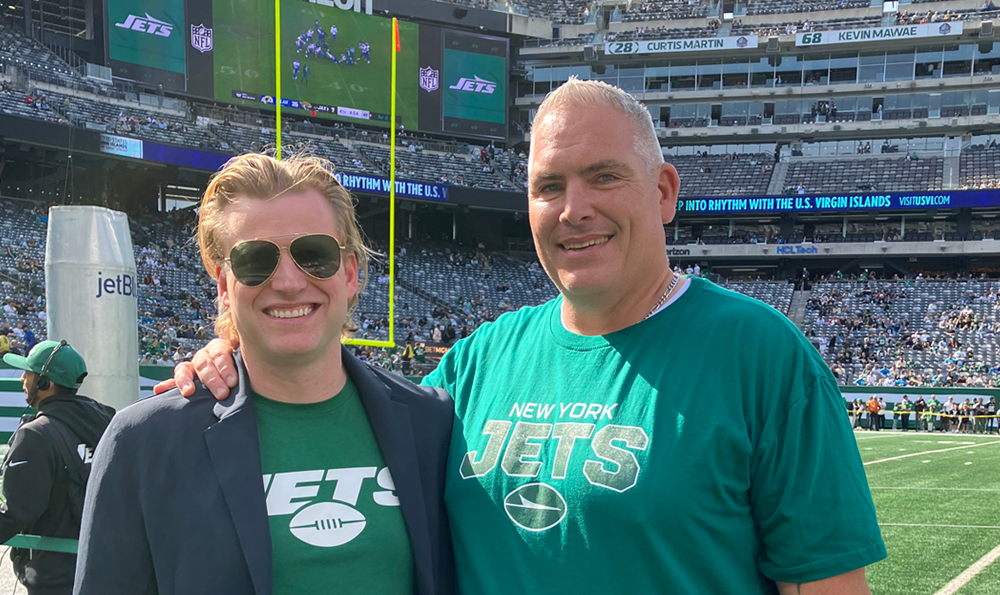As a specialized tactical team officer and paramedic for the NJ Transit Police Department, Paul was no stranger to physical exertion and stress. So, when he began feeling winded during routine fitness training, he chalked it up to his age, poor sleep, demanding work, and time devoted to his wife and two energetic kids at home in Lake Hopatcong. Paul had no idea his heart was failing—and fast.
Subtle signs start showing up
Paul’s symptoms began subtly in January 2024, during his annual self-contained breathing apparatus (SCBA) testing—equipped with face mask and oxygen tank—where he found himself constantly out of breath.
“I thought it was just me trying to keep up with the younger guys on the team,” says Paul, who was 47 at that time. “I also wasn’t sleeping well, with two little ones needing me at home. It just felt like life was catching up with me.”
A medical team follows the clues
Paul’s symptoms persisted, leading to extreme pressure on his chest, so he went to Atlantic Health Morristown Medical Center’s emergency department where he underwent additional testing. Following up with his cardiologist, Vignesh Raghunath, MD, the echocardiogram revealed that Paul had severe aortic stenosis, a narrowing aortic valve that restricted blood flow from his heart. The condition—if left untreated—could be fatal.
“Echocardiograms save lives,” says Paul. “I’m living proof because this test isn’t typically done at a routine physical exam, and I had no idea how seriously I needed to take this news about my heart.”
A complex diagnosis and a clear path forward
After further evaluation by his specialized cardiac team, it was discovered that not only did Paul have severe aortic stenosis, he also had a bicuspid aortic valve. This is a congenital condition in which his aortic valve had only two cusps instead of three.
That’s when Benjamin van Boxtel, MD, surgical director at the Atlantic Aortic Center at Morristown Medical Center, joined the team. When he met the six-foot-five, 350-pound former Villanova college football player, Dr. van Boxtel knew there was only one path forward. He recommended the Ross procedure, a rare and technically demanding surgery to reconstruct and repair Paul’s heart.
Paul remembers that conversation well. “Mechanical valves would have meant lifelong blood thinners, making it impossible to do my job. Tissue valves would wear out fast and require repeat surgeries. But Dr. van Boxtel’s Ross procedure would give me my life back—with no restrictions.”
Confidence in an experienced aortic team
Dr. van Boxtel explains the complex procedure. “We replaced Paul’s failing aortic valve with his own pulmonary valve. Then we used a donor valve to replace his pulmonary valve. Paul also needed an aortic root reconstruction and aneurysm repair, making his surgery that much more intricate.”
The lengthy surgery also required a high level of advanced planning. For example, to support blood circulation for Paul’s large, strong body, perfusionists had to harness multiple systems and equipment. Even more complicated, when doctors became concerned about Paul’s antibody levels in his blood, a hematology specialist was added the team.
A full recovery, a grateful heart
Paul’s recovery was swift and inspiring. He was discharged from the hospital within a week, cleared to begin cardiac rehabilitation, and gradually able to begin rebuilding his strength.
Now, nearly a year post-op, Paul is back to full active duty with no restrictions. “I’m back in the gym. I’m coaching T-ball and flag football. I’m working full-time. I feel strong again,” Paul says, crediting the daily support of his wife and family—along with his Atlantic Health team.
“These people didn’t just fix my heart—they gave me my life back,” Paul says. “It was a full team effort. My doctors, perfusion techs, hematologists, nurses—everyone came together to get me safely through this, and they have my full and deepest gratitude.”












